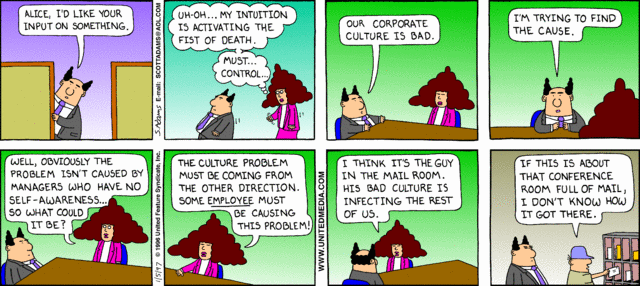The corporate culture dilemma
The top pressure for any organization today is to move faster in an era of less predictable outcomes: Markets shift faster, technology is obsolete sooner and customers have higher expectations. As a result, many companies are plagued by change overload!
Culture is critically important to business success worldwide, according to “Culture and Change Management Survey”, conducted by Booz & Company. Key findings:
- 84 percent of respondents and 86 percent of C-suite respondents believe that their organization’s culture is critical to business success.
- 60 percent said culture is more important than the company’s strategy or operating model.
- 96 percent said some form of culture change is needed within their organization.
- 51 percent believe their organization is in need of a major culture overhaul.
- 45 percent do not think their culture is being effectively managed.
Leaders must learn how to tap company culture as an enabler of speed, so this essential asset can become fuel for profitable growth in a change-driven era.
Corporate culture comics
How does Dilbert see the current status of corporate culture? Dilbert is a comic strip written and illustrated by Scott Adams. Dilbert is known for its satirical office humor about a white-collar, micromanaged office featuring the engineer Dilbert as the title character.
New corporate culture
Influenced by corporate culture
Corporate culture that drives innovation
Corporate culture is dead
Short URL & Title:
Corporate culture comics — https://www.torbenrick.eu/t/r/fgn
Share it:
If you enjoyed this article, please take 5 seconds to share it on your social network. Thanks!












Hello Torben,
How truthfully and sadly those caricatures reflect the current state of many companies´ organizational cultures! Over my years working as a consultant, I have found that many companies believe that organizational cultures and the values represented by those cultures, are mere decoration in the halls and lobbies of the company´s headquarters. They posted visibly so that customers and third parties can read how great those companies are. The executives from those companies seem to forget that role modeling and living by those values are more important, productive and effective than plastering posters all over the walls of a building.
Good article!
Dr. Gallego-Toledo
I love the Dilbert cartoons! Using humour as a way of raising issues has always been a great idea. Are employees ‘good people’ influenced by ‘corrupt cultures’? how can they maintain integrity and how can it be aligned to corporate culture?
In a time of so many corporate scandals – it seems that a lot of people don’t care.
Great article in Management Today about saying sorry and whether it has any meaning http://www.managementtoday.co.uk/news/1335863/hsbc-art-public-apology/?DCMP=ILC-SEARCH
Using humor and comics depicting the corporate scene is just so genius.